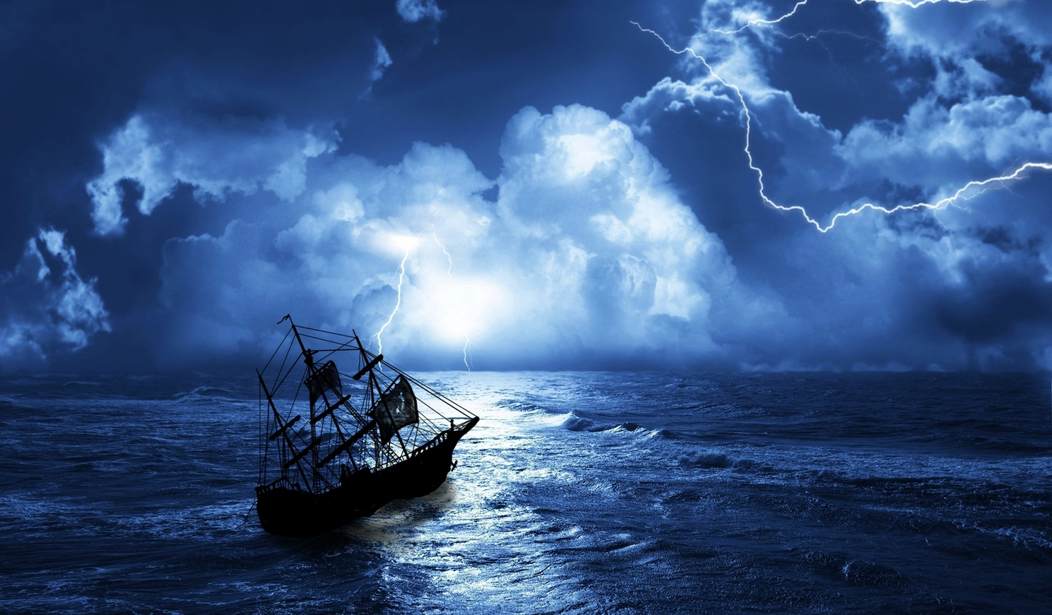News that CAIR has demanded an apology from Donald Trump for evicting a Muslim protester at his rally and reports that left-wing protesters and police have turned out in force to bottle up “far-right” demonstrators in Germany bookend a single story. It’s on — the long-awaited fight against PC orthodoxy is finally on. Trump is unlikely to apologize, and CAIR is even more unlikely to back down. With 3 million Middle Eastern and African refugees due to arrive in Europe this year, the clashes between German protesters are only likely to intensify.
The commotion you hear is not going to stop, it will only get worse. The Western Spring is finally here, and before it’s done it threatens to change everything.
The tension between the forces of political correctness and the pent-up forces of repressed cultural traditions is now bursting like a spring wound up beyond containment. Things may start slowly at first but ramp up rapidly, mirroring Cornelius Ryan’s famous description of the Berlin Philharmonic’s last performance as the Red Army stood at the gates of Berlin.
The drum beat was almost imperceptible. Softly the tubas answered. The muffled drum roll came again. Low and ominously the tubas replied. Then the massed basses came alive and the awesome grandeur of Die Götterdämmerung rolled out from the Berlin Philharmonic … it told of the evildoing of the gods, of Siegfried on his funeral bed of fire … with cymbals crashing and drums rolling, the orchestra thundered to its climax: the terrible holocaust that destroyed Valhalla
Actually the last performance of the doomed orchestra “was of Brünnhilde’s Immolation Scene at the end of the opera.” Ryan’s word painting may get the history wrong but nevertheless gets the analogy right. It’s the twilight of the gods. In 1945 the musicians wore escape clothes under their overcoats because it had been arranged for them to escape toward the American lines as soon as the performance ended.
Seventy years later, the question facing people caught in the middle is where to run. There is nowhere obvious. In Europe, Ross Douthat argues, all exits are temporarily blocked. The left has destroyed the middle, leaving only a choice of extremes. “Just last week Merkel rejected a proposal to cap refugee admissions (which topped one million last year) at 200,000 in 2016.”
if you add a million (or millions) of people, most of them young men, in one short period, you get a very different kind of shift. … Such a transformation promises increasing polarization among natives and new arrivals alike. It threatens not just a spike in terrorism but a rebirth of 1930s-style political violence.
Everywhere one looks the matches are being lit. The sudden outburst of resistance comes at the end of what Jonah Goldberg called “a bad day” for the Narrative. A bad sequence of decades since 2001, more like it.
Roving bands of rape gangs are fanning out across Europe. … The international economy is turning into one long “Buy Gold” commercial. President Obama has responded to a renewed terror threat and chaos in the Middle East by redoubling his efforts to keep the boom in gun sales and NRA donations going for the rest of his presidency. …
ISIS released a video showing them working with surface-to-air missiles, while we’ve apparently been shipping missiles to Cuba. Iran expedited its ballistic-missile program and the Obama administration threatened to do something about it but then chickened out. Saudi Arabia and Iran seem minutes away from open war with one another and President Obama’s advisers reportedly think his Iran deal is a source of “stability” in the Middle East … North Korea detonated an atomic bomb (which may have been a hydrogen bomb). And Time magazine has already declared Donald Trump the winner.
But the impetus may switch since in the nature of things activists who oppose the radical left may get around to doing something equally stupid or mean. Politics is a two-way street. The Narrative will have its good days to the consternation of those who find themselves whipsawed between a status quo they can no longer accept and the leadership of an insurgency they have yet to trust. The leaders of the terror may perish by their own instruments after the aristocrats are gone and Paris will be beautiful again, but not before a lot of water goes over the dam.
There is nothing unusual in this. It is in fact standard for the status quo to encourage the most disturbing alternative to itself on the theory that people prefer the devil they know to one they have just met. Bashar Assad, for example, actually encouraged the rise of ISIS to leave no alternative to anyone but himself. The Western Spring may bring hope, but it also brings peril, for it unleashes one set of forces to counter another.
A political crisis of the kind which may engulf Europe has a destabilizing effect analogous to free-surface flooding in ships. This occurs when tons of liquid slosh inside a ship and slam it from one side to another. The great transatlantic liner SS Normandie sank during WW2 in New York harbor from the water pumped into her by firefighters trying to put out a blaze. Suggestions from her designer to flood her to shallow bottom were rejected in favor of a failed program of flooding and counter-flooding which caused her to heel over and capsize.
In the same way, periods of political upheaval will threaten to overturn societies unless people pay attention. One advantage the United States theoretically enjoys over Europe during periods of free-surface flooding is the Constitution. This serves as a foundation, a sort of ballast which lowers the meta-centric height of the ship of state and keeps it on an even keel in all but the roughest sailing.
It was meant to provide a check against excesses from either side in a political duel. The Constitution itself used to rest upon an even more basic rock, a widely shared set of assumptions, moral and religious beliefs which obtained at the beginnings of the nation. That gave it tremendous stabilizing power. Unfortunately the left has steadily chipped away at this Constitutional ballast and the stone on which it was builded, a fact they may regret before long.
The need for a source of authority independent of politics was memorably expressed in Robert Bolt’s A Man For All Seasons. In the play More clings to the ground even at the cost of surrendering advantage. The Constitution has long provided the ground more desired. Without it, political conflict is perilous.
William Roper: So, now you give the Devil the benefit of law!
Sir Thomas More: Yes! What would you do? Cut a great road through the law to get after the Devil?
William Roper: Yes, I’d cut down every law in England to do that!
Sir Thomas More: Oh? And when the last law was down, and the Devil turned ’round on you, where would you hide, Roper, the laws all being flat? This country is planted thick with laws, from coast to coast, Man’s laws, not God’s! And if you cut them down, and you’re just the man to do it, do you really think you could stand upright in the winds that would blow then? Yes, I’d give the Devil benefit of law, for my own safety’s sake!
Now as the Western Spring begins in earnest the issue which rebels must grapple with is not only who can best lead them against the status quo, but who can do so Constitutionally. In any descent into chaos, some thought must be given to the means by which a return can be made to sanity. Once the public would have been familiar with the classic story of how Theseus slew the Minotaur, a monster who dwelt in the Labyrinth, a mazelike structure so baffling that even if Theseus could defeat the monster, he could never find his way out again. Theseus solved the problem by unwinding a length of string from the entrance.
Finding a way out after slaying the Minotaur is every revolutionary’s problem. But we have forgotten both the classics and the Constitution in our civilizational vanity to the detriment of our safety. We have learned how to wander but forgotten how to reckon where we are.
Follow Wretchard on Twitter
Recently purchased by readers:
Silent and Unseen: On Patrol in Three Cold War Attack Submarines, This is a memoir of a submariner’s life on a U.S. attack submarine during the Cold War. The author, Capt. Alfred S. McLaren, a submarine officer and nuclear attack submarine commander, describes the significant events that occurred during his seven years, 1958-65, on board three attack submarines: the USS Greenfish (SS 351), USS Seadragon (SSN 584), and USS Skipjack (SSN 585). Capt. McLaren took part in the first submerged transit of the Northwest Passage, a Baffin Bay expedition, and, as commander of USS Queenfish (SSN 651), a North Pole expedition that completed the first survey of the entire Siberian Continental Shelf. His stories and anecdotes offer a look at the development of attack-boat tactics and under-ice exploration techniques.
The Genesis of Science: How the Christian Middle Ages Launched the Scientific Revolution, Physicist and historian of science James Hannam shows that without the scholarship of the “barbaric” Middle Ages, modern science simply would not exist. “The people of medieval Europe invented spectacles, the mechanical clock, the windmill, and the blast furnace by themselves. Lenses and cameras, almost all kinds of machinery, and the industrial revolution itself all owe their origins to the forgotten inventors of the Middle Ages,” he writes.
Samsung USB 2.0 Ultra Portable External DVD Writer Model SE-218CB/RSBS, Highly rated for speed, performance and price.
Did you know that you can purchase some of these books and pamphlets by Richard Fernandez and share them with your friends? They will receive a link in their email and it will automatically give them access to a Kindle reader on their smartphone, computer or even as a web-readable document.
The War of the Words for $3.99, Understanding the crisis of the early 21st century in terms of information corruption in the financial, security and political spheres
Rebranding Christianity for $3.99, or why the truth shall make you free
The Three Conjectures at Amazon Kindle for $1.99, reflections on terrorism and the nuclear age
Storming the Castle at Amazon Kindle for $3.99, why government should get small
No Way In at Amazon Kindle $8.95, print $9.99. Fiction. A flight into peril, flashbacks to underground action.
Storm Over the South China Sea $0.99, how China is restarting history in the Pacific
Tip Jar or Subscribe or Unsubscribe to the Belmont Club










Join the conversation as a VIP Member